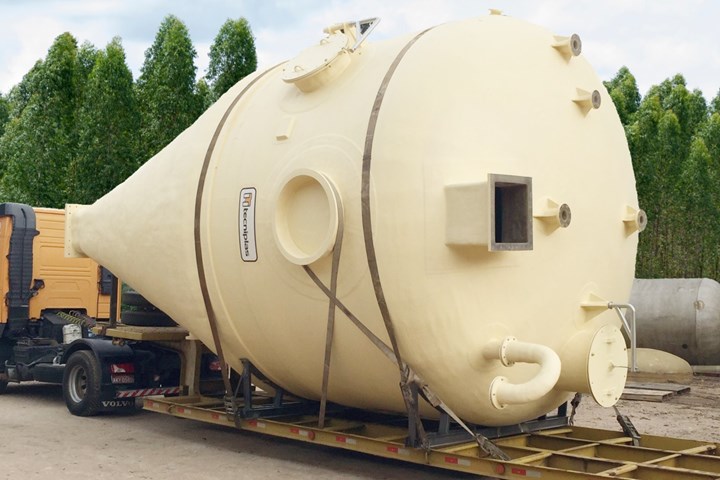Tecniplas supplies composite silos for manufacture of pectin
The composite silos supplied by Tecniplas will be part of the production process of pectin in the food industry. Pectin is a texturizing agent based on citrus fruits.

Of the four largest silos supplied by Tecniplas to Cargill, two have a diameter of 4,500 millimeters and two have a diameter of 5,000 millimeters. Photo Credit: Tecniplas.
Cargill's (Wayzata, Minn., U.S.) soon-to-be-inaugurated pectin factory in Bebedouro, Brazil, has composite silos manufactured by Tecniplas (Cabreúva, São Paulo, Brazil). Pectin is a texturizing agent based on citrus fruits, and the silos supplied by Tecniplas will receive the orange peels that will be part of the production process of this raw material for the food industry.
At other Cargill plants around the world, silos of this type are made of duplex steel, a type of noble metal alloy. Tecniplas’ composite silos are said to have proved to Cargill the adequacy of composites, not only in terms of design versatility but also in chemical and mechanical resistance.
Of the four largest silos supplied to Cargill, two have a diameter of 4,500 millimeters and two at 5,000 millimeters. “The manufacture of the rectangular bottom was unprecedented for Tecniplas and the biggest challenge of this project. As it is a unique piece, we developed all the molds from scratch,” Luís Gustavo Rossi, director of Tecniplas, explains. Tecniplas reportedly produced 18 different “special equipments” for this project, including the silos.
Related Content
-
Running shoe insoles get a lift with thermoplastic fiberglass tapes
FlexSpring insoles take advantage of unidirectional, continuous fiberglass and thermoplastics to enable next-level performance for the everyday runner.
-
Toray rCF from Boeing 787 is incorporated into ultra-light laptops
Torayca-based aerospace components have successfully been repurposed into the Lenovo ThinkPad X1 Carbon Gen 12, highlighting the ongoing application of recycled composites.
-
Plant tour: Arris Composites, Berkeley, Calif., U.S.
The creator of Additive Molding is leveraging automation and thermoplastics to provide high-volume, high-quality, sustainable composites manufacturing services.












